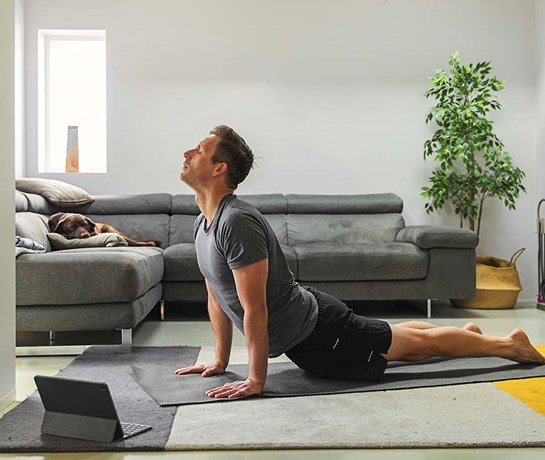

If life still feels upside down, that’s because it is. Summer weather didn’t slow down the coronavirus. Many parts of our lives continue to feel like a roller coaster ride: school is on, then it’s off; places are open, then they’re closed; and worries about work, finances, social unrest and loved ones alone in nursing homes and hospitals are, well, still worrisome. What are we feeling? Call it COVID-weariness, emotional exhaustion, burnout or compassion fatigue — it all boils down to unusually stressful times with no end in sight.
Emotional exhaustion refers to feeling mentally and emotionally drained from accumulated stress. It affects people differently, but it can include both emotional and physical symptoms. It’s normal to have days when we feel directionless, overloaded or unappreciated, but feeling this way most of the time can take a toll on our immune system, blood pressure, weight and overall sense of well-being.
The emotional signs of exhaustion include a loss of motivation; feeling helpless, trapped and defeated; having an increasingly negative outlook; feeling alone in the world; and having a decreasing sense of satisfaction. Physical symptoms may include feeling tired regularly, frequent headaches or other tension/ muscle pain, stomach upset, craving carbohydrate “comfort” foods, sleep problems (not enough or too much), chest pain, rapid heartbeat and frequent illnesses.
Our actions can show signs of exhaustion or burnout too. Missing work or coming in late and leaving early, putting off tasks or taking longer to get them done, avoiding (virtual) social interaction, using food (or drugs and alcohol) to cope, and taking frustrations out on others are behaviors associated with too much stress.
So many major life events (raising children, having a baby, money concerns, working high-pressure jobs, care-giving, death of a loved one, divorce, living with chronic illness or injury) can trigger these symptoms but add the events of the past months and it’s understandable if you aren’t feeling yourself.
A related type of weariness often felt by nurses, doctors, therapists and other professional caregivers is called compassion fatigue. It’s not that you don’t care, it’s that you become too physically, emotionally and psychologically exhausted to feel for others. Essential workers who spend long hours on the front lines where the risk of infection is greater are prone. This type of fatigue has crept further into the mainstream as our concern about the health and safety of our loved ones and 24/7 reports of loss, hardship and violence continue.
Keep in Touch!
One of the best ways to manage stress during the pandemic is to stay in touch with friends and family. Talking by phone or video chat (or email) means you are sharing news and burdens. It helps to discuss current events but also other topics that are funny or important to you. Especially for those who are more isolated (like the elderly or people who live in remote areas), staying in touch helps to reduce the sense of feeling alone in this.
Now is a great time to reconnect with people from the past. You never know when a call or letter from an old friend or colleague may brighten their day!
Chatting with a friend on the phone (or in person safely distancing and wearing a mask) while you walk is a way to stay connected and active.
Small Steps
During these unprecedented times, it helps to focus on how to reduce demands on our energy and build up our reserves. Here are some tips that can have lasting effects:
· Look out for number one. You might think there isn’t time to take care of yourself, but that’s another way of saying that other people’s wellness is more important than your own. In order to help others, you must first help yourself! What boundaries can you set and when can you say no? Can you ask for help from family members, neighbors or co-workers? Can you delegate tasks to others?
· Set limits around people or things that feel toxic to you. Who or what drains your energy? If you have a difficult relationship with a co-worker, consider talking openly (and calmly) with him or her, or ask a manager for help. S/he may be able to mediate a resolution that will ease tensions. Limit time spent watching the news, checking social media or any other activities that trigger stress for you.
· Rest up. Our bodies need 7-9 hours of sleep to recover from the day’s curveballs. Not sleeping enough or sleeping too much can add to stress levels and be a sign of depression. At bedtime, create a soothing environment by turning down lights, turning off screens and playing relaxing music.
· Use micro-breaks. After about two hours of focused work, a micro-break (2-20 minutes) can refuel you. Meditation, the practice of focusing on a particular thought, object or activity, can help settle racing thoughts and bring a new perspective. Yoga, guided imagery and deep breathing are other ways to nurture a new calm.
· Stay active. Physical activity — anything from vacuuming and gardening to walking and biking — increases endorphins and serotonin levels, the feel-good hormones. Exercise can take your mind off your problems and lift your mood. Try to do something active every day for at least 30 minutes.
· Avoid alcohol. It can temporarily improve your mood by boosting those same feel-good hormones, but as your body flushes out the alcohol, the hormone levels drop too. You are left feeling blue, and probably tired, because alcohol interferes with sleep. Routine alcohol use can contribute to anxiety and depression.
· Watch out for starchy carbohydrates (white bread/rice, baked goods, sugary drinks and processed snack foods), which spike your blood sugar and send your energy levels tumbling down. A good balance of protein, healthy fats and lower carb foods (fruit, vegetables, beans and whole grains) will supply a steadier flow of energy. Plus these foods can boost mood and help you maintain a healthy weight.
· Staycation? Since vacations are probably cancelled this summer, plan a couple days at home to do something you don’t normally have time for. Try to put worries on vacation so you can relax.
· Reduce screen time. Besides exposing yourself to potentially stressful material online, excess screen time can lead to computer vision syndrome, a condition linked to strained and dry eyes, blurred vision, headaches and fatigue. Turn off screens an hour before bedtime since they can make you more alert and reduce the quality of your sleep.
While it is not possible to remove all of life’s stressors, it is possible to break them down into smaller, more manageable pieces. Pick one or two areas to work on, and with some time, we hope you’ll be feeling a bit more energized.
Want to Read More?
Check out some of our past newsletters on related topics
What’s Your New Normal? Loss, Grief, Resilience and Hope
The Path to Emotional Wellness. How to Improve Your Resiliency
Is Breaking News Breaking You? How to Stay Informed while Minimizing Stress
Need More Help?
If you feel you need a little more support while you make some lifestyle changes, reach out. Your employer may offer an Employee Assistance Program (EAP) or consider visiting a therapist (many now offer virtual visits). KnovaSolutions can also provide information and support through this stressful time. Ask your clinician about our new mobile messaging app — a tool for staying in closer touch with your KnovaSolutions nurse.
KnovaSolutions is here to help! Give us a call at 800/355-0885 Monday to Friday, 8 am-8 pm, Mountain Time.
Click here to view/download the full newsletter. We encourage you to leave a comment or question below and a KnovaSolutions nurse or pharmacist will reply.
The information contained in this newsletter is for general, educational purposes. It should not be considered a replacement for consultation with your healthcare provider. If you have concerns about your health, please contact your healthcare provider.





